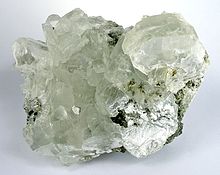neufer wrote:MemyselfandI wrote:
Where did the matter come from in the first place?
https://en.wikipedia.org/wiki/A_Universe_from_Nothing wrote:
<<A Universe from Nothing: Why There Is Something Rather than Nothing is a non-fiction book by the physicist Lawrence M. Krauss, initially published on January 10, 2012 by Free Press. It discusses modern cosmogony and its implications for the debate about the existence of God. The main theme of the book is how "we have discovered that all signs suggest a universe that could and plausibly did arise from a deeper nothing—involving the absence of space itself and— which may one day return to nothing via processes that may not only be comprehensible but also processes that do not require any external control or direction.">>
The words, "suggest, plausibly, may" do not explain an answer, they merely point to one theory, probably (sic) among many. The original post was rather more definite, "Where your elements came from." My question was, where did the matter come from in the first place? An ex nihilo postulation only makes rational sense if one can argue for something (or someone) to create from nothing.
From the Wikipaedia article cited (
https://en.wikipedia.org/wiki/A_Universe_from_Nothing):
"In the New York Times, philosopher of science and physicist David Albert said the book failed to live up to its title; he claimed Krauss dismissed concerns about what Albert calls his misuse of the term nothing.[7]
"Commenting on the philosophical debate sparked by the book, the physicist Sean M. Carroll asked, "Do advances in modern physics and cosmology help us address these underlying questions, of why there is something called the universe at all, and why there are things called 'the laws of physics,' and why those laws seem to take the form of quantum mechanics, and why some particular wave function and Hamiltonian? In a word: no. I don't see how they could."[8]
"Science journalist John Horgan, writing for Scientific American, characterizes the book as "...a pop-science book that recycles a bunch of stale ideas from physics and cosmology." [9]
"Physicist George F. R. Ellis characterized the book's thesis as "...presenting untested speculative theories of how things came into existence...". Referring to the entities Krauss assumes to exist, Ellis says "He does not explain in what way these entities could have pre-existed the coming into being of the universe, why they should have existed at all, or why they should have had the form they did. And he gives no experimental or observational process whereby we could test these vivid speculations of the supposed universe-generation mechanism. How indeed can you test what existed before the universe existed? You can’t. Thus what he is presenting is not tested science." [10]
"The mathematical physicist I. S. Kohli also analyzed the main technical arguments in Krauss' book, concluding that "many of the claims are not supported in full by modern general relativity theory or quantum field theory in curved spacetime".[11]"

